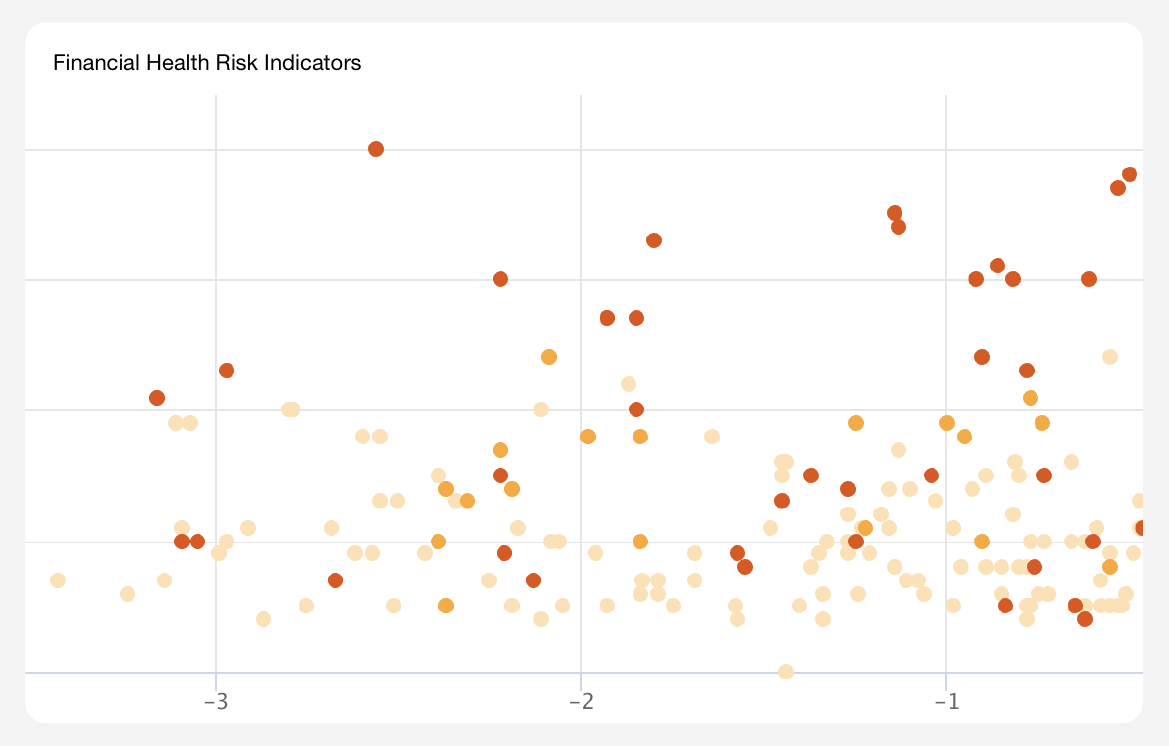AbbVie Inc.
Supplier Financial Health Report
Overview
June 2024
USA
Incorporated Country
50,000
Number of Employees
A+
Credit Rating
20
Count of Investments

Five-Year Financial Trend Analysis for AbbVie Inc.
CONSTANT
Credit Trend
404.51%
Total Balance Sheet Growth Rate
56.96%
Total Debt Growth Rate
The balance sheet also reflects this growth, with a total balance sheet value increasing from $27.51B in 2014 to $138.8B in 2022, a 404.51% change. The cash trend has also shown an increase, rising from $8.35B in 2014 to $9.2B in 2022, a 10.22% change. However, the short-term investments trend has shown a decrease, dropping from $772M in 2018 to $28M in 2022, a 96.37% change.
Total debt and liabilities have also increased, rising from $40.31B in 2018 to $63.27B in 2022 and $67.8B in 2018 to $121.52B in 2022, respectively. This could be a concern if not managed properly, as it may impact the company's ability to meet its financial obligations. However, the stockholders equity trend has shown a significant increase, rising from -$8.45B in 2018 to $17.29B in 2022.
The net income and EBITDA trends have also shown substantial growth, with net income rising from $4.13B in 2013 to $11.84B in 2022 and EBITDA rising from $10.04B in 2016 to $23.99B in 2022. The net operating cash flow trend has shown an even more impressive increase, rising from $3.55B in 2014 to $24.94B in 2022.
AbbVie's credit rating is A+, indicating strong financial health and low credit risk. Its credit score of 95 is excellent, and the credit trend has been constant. The company has had three exits and has raised $15.002B in funding through two rounds. With a high number of investments, 20 in total, AbbVie has a diversified investment portfolio.
In conclusion, AbbVie Inc.'s financial health is strong, with significant revenue and balance sheet growth, strong credit ratings and scores, and impressive net income, EBITDA, and net operating cash flow trends. However, the increase in total debt and liabilities is a potential concern that should be monitored closely. Overall, AbbVie's financial health is in line with industry standards for a biopharmaceutical company.
Financial Health Risk Assessment for AbbVie Inc.
LOW
Credit Risk
LOW
Bankruptcy Risk
MEDIUM
Financial Health Risk
The balance sheet also reflects this growth, with a total balance sheet value increasing from $27.51B in 2014 to $138.8B in 2022, a 404.51% change. The cash trend has also shown an increase, rising from $8.35B in 2014 to $9.2B in 2022, a 10.22% change. However, the short-term investments trend has shown a decrease, dropping from $772M in 2018 to $28M in 2022, a 96.37% change.
Total debt and liabilities have also increased, rising from $40.31B in 2018 to $63.27B in 2022 and $67.8B in 2018 to $121.52B in 2022, respectively. This could be a concern if not managed properly, as it may impact the company's ability to meet its financial obligations. However, the stockholders equity trend has shown a significant increase, rising from -$8.45B in 2018 to $17.29B in 2022.
The net income and EBITDA trends have also shown substantial growth, with net income rising from $4.13B in 2013 to $11.84B in 2022 and EBITDA rising from $10.04B in 2016 to $23.99B in 2022. The net operating cash flow trend has shown an even more impressive increase, rising from $3.55B in 2014 to $24.94B in 2022.
AbbVie's credit rating is A+, indicating strong financial health and low credit risk. Its credit score of 95 is excellent, and the credit trend has been constant. The company has had three exits and has raised $15.002B in funding through two rounds. With a high number of investments, 20 in total, AbbVie has a diversified investment portfolio.
However, it is important to note that the increase in total debt and liabilities is a potential concern that should be monitored closely. The company's liquidity position, as indicated by its current ratio and quick ratio, is slightly below average, suggesting that it may have limited flexibility to meet its short-term obligations. The debt-to-equity ratio is also quite high, indicating that the company has been relying heavily on debt to finance its growth, which could potentially increase financial risk.
In conclusion, AbbVie Inc.'s financial health is strong, with significant revenue and balance sheet growth, strong credit ratings and scores, and impressive net income, EBITDA, and net operating cash flow trends. However, the increase in total debt and liabilities and the below-average liquidity position are areas of concern that should be monitored closely. It is crucial for investors and stakeholders to continue to closely monitor AbbVie's financial performance and take appropriate actions to mitigate these risks.
List of UEIs for AbbVie Inc.
ABOUT SUPPLIER FINANCIAL HEALTH REPORTS
Ark provides definitive, consolidated analyses of every vendor, subcontractor, supplier, grant awardee, non-profit, and investment organization in the national security and defense sectors. Supplier financial health reports are AI-assisted analyses of the current health and stability of an organization, as well as the trends, trajectory, and risk indicators that partners and stakeholders need to know about.
Explore Additional Analyses
ABOUT ARK.AI
The Ark is the only software platform purpose-built for Defense Acquisition that leverages authoritative commercial data and AI-enabled Applications designed to solve Acquisition challenges. With the Ark, analysts and decision-makers gain the ability to manage Acquisition programs proactively, allowing them to unwind the legacy complexity and effectively field modern warfighting systems that compete with China.
The Leading Defense Acquisition Software.








OUR APPLICATIONS
AI-enabled Applications within The Ark reflect standard workflows across the Defense Acquisition Process. From Science & Technology to Modernization, these Applications allow for the execution of rapid, efficient, data-informed decisions, standardized reporting, and efficient workflow management. The Ark enables your team to transform Defense Acquisition into a strategic advantage.